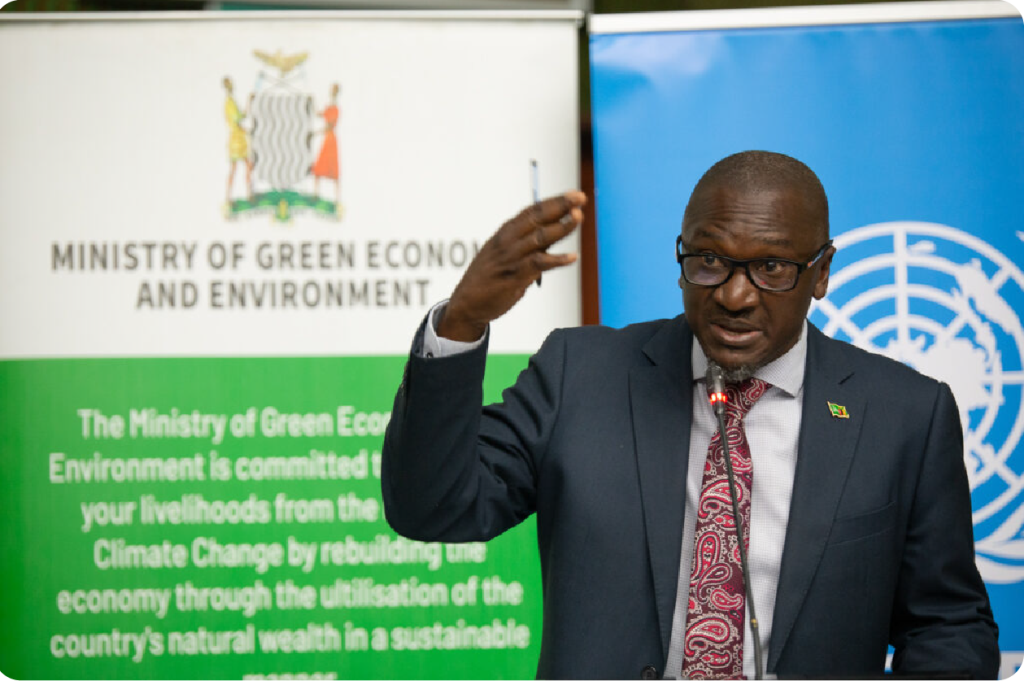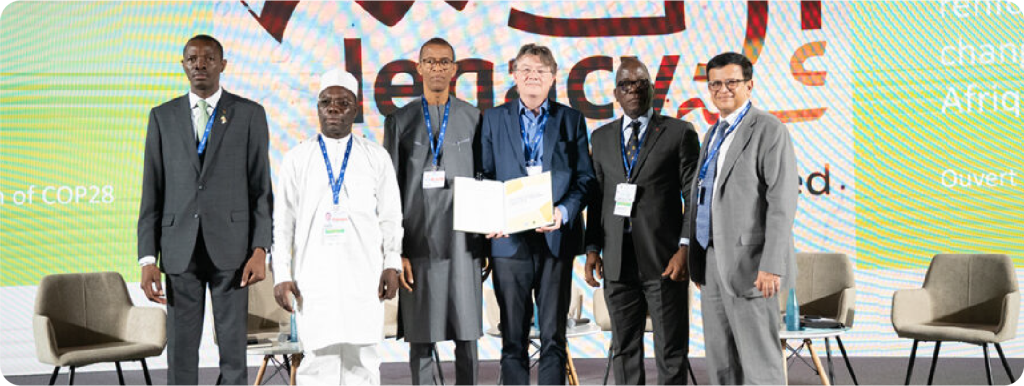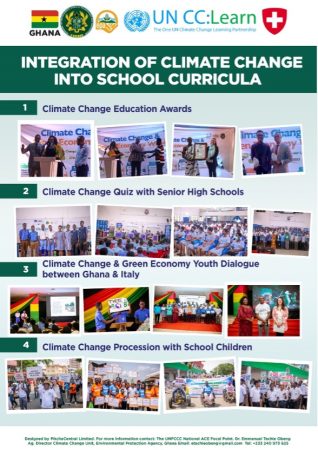UN CC:Learn New Partner Countries
Liberia and Ecuador are the two latest countries to officially join the UN CC:Learn Partnership in 2023, having formally expressed interest in developing a National Climate Change Learning Strategy and a National ACE Strategy respectively, intending to strengthen knowledge and skills on climate change.
Liberia
Liberia’s journey in the UN CC:Learn partnership in 2023 begun with a scoping mission to Monrovia by the UN CC:Learn Head of Secretariat and Director of the Planet Division at UNITAR, Angus Mackay supported by the Environmental Protection Agency (EPA), where he met several key partners on the development of the National Climate Change Learning Strategy and explored the development of a larger UNITAR programme on human skills development in Liberia, leveraging UNITAR’s specific experience and expertise across multiple areas, with funding from UNITAR’s Leave No One Behind Fund.
2023 saw the planning stage of the project to develop the Learning Strategy with development of work plans, discussions with other key partners and recruitment of a team of experts to work with the EPA and UN CC:Learn to advance the strategy development process.
Ecuador
UN CC:Learn engaged with Ecuador, responding to a request for support through the NDC Partnership to develop the country’s National Strategy for Action for Climate Empowerment (ENACE). Multiple discussions took place over the course of 2023 with the Ministry of Environment, Water and Ecological Transition and the NDC Partnership in-country facilitator to define the scope of the strategy and the contribution of the different institutions. The United Nations Children’s Fund (UNICEF) also came on board as a key partner.
The consultations resulted in the definition of a National Strategy for Action for Climate Empowerment (ENACE) development process that is characterized by a broad territorial, participatory and inclusive approach. Furthermore, the process provides an excellent opportunity to collect input for and connect the ENACE with the Second NDC of Ecuador (2026- 2035).
Launch of the IKI-funded Facility for Action for Climate Empowerment to Achieve the Nationally Determined Contributions (FACE-NDC) Project in Zambia
On 25 October 2023, UN CC:Learn took part in the launch of the 7-year FACE-NDC project, the largest investment in climate education to date, totaling a 17 million EUR contribution from Germany’s International Climate Initiative (IKI). The project promises to reshape Zambia’s approach to climate change education and build the capacity of Zambians on climate change by 2030.
The project will be supporting the Government of Zambia in implementing its National Climate Change Learning Strategy, crafted in 2019 with support from UN CC:Learn. It will be implemented by a consortium of five partners, including UNITAR, UNESCO, FAO, Copperbelt University, and the University of Zambia, to impact approximately 2 million beneficiaries, encompassing school-going learners, adult learners, teachers, educators, trainers, and professionals in both public and private sectors.

Minister of Green Economy and Environment, at the launch event of the FACE-NDC Project. Photo: Lorenzo Franchi / UN CC:Learn
Supporting 5 countries to Implement Action for Climate Empowerment through the NDC Partnership
UN CC:Learn strengthened its collaboration with the NDC Partnership through support to requests for support from the NDC Partnership Action Fund (PAF) and implementation of ACE activities in 3 countries:
- Zimbabwe: UNITAR designed and delivered a week-long Climate Diplomacy Programme in October 2023 for Zimbabwe Negotiators training in Bulawayo, Zimbabwe, in preparation for COP28 negotiations, benefitting 54 participants (24 women, 30 men, 64% youth).
- Benin: Strengthening communication and monitoring of the NDC in Benin through the development of an NDC synthesis document, which summarizes and simplifies the content of the NDC in French. In November 2023, a workshop in Cotonou, Benin brought together over 40 representatives to officially launch the project and discuss the proposed NDC synthesis document and its dissemination in detail. Arrangements were advanced for organising a series of related radio and TV programmes to raise public awareness of climate change.
- Burkina Faso: Training and awareness raising around the NDC in Burkina Faso. An inception discussion with all stakeholders took place in October 2023, resuming in early 2024, with the appointment of a dedicated Government focal point and the review of the existing training materials that will underpin the delivery of the workshops defined under the project.
In addition, UN CC:Learn was successful in its proposal to support
- Kyrgyz Republic: on strengthening climate action through a holistic approach to capacity building and public awareness raising for low carbon and climate resilient development, building on the 2021 Comprehensive Plan of Measures on Climate Change Learning that was supported by UN CC:Learn.
- Niger: Further assist the Government of Niger through the NDC Partnership Action Fund (PAF) to raise awareness of the NDC.
UN CC:Learn Continued Support to Long-standing Partner Countries
The West Africa Regional Hub Makes Waves on Financing for Climate Education
A field mission to 6 countries – Burkina Faso, Côte d’Ivoire, Guinea, Niger, Senegal, and Togo, was conducted in early 2023 to discuss climate change education and training, including existing priorities and needs for potential support, to assess possible partnerships, resource mobilization options, and advocacy to increase financing for climate education in the sub-region. A report on this mission also highlights good practices from around the region on climate change learning.
Following this, UN CC:Learn organized a regional meeting at SB58 on enhancing climate change education in West Africa, bringing together the six countries, along with Ghana and Liberia, and the regional training center Agrhymet, to advance the development of a regional declaration and plan the next steps. UN CC:Learn, together with the UNFCCC and MECCE Project, also supported the participation of several ACE focal points from West Africa to attend the ACE Dialogue and ACE Workshop during the SB58.
In December 2023, five West African nations signed the Regional Declaration on Strengthening Climate Change Education at COP28, committing to increasing funding for comprehensive climate literacy efforts in the region.

Advancing Climate Change Awareness and Education in Ghana
UN CC:Learn provided support to the Government of Ghana through the Environmental Protection Agency in a series of events including:
- The National Climate Change and Green Economy Week which featured several public awareness initiatives including Youth Climate Dialogues, a climate change quiz and symposium for students, media discussions on TV and radio, street processions and community bazaars.
- Development of education materials through the Climate Change Posters that were also showcased at the ACE Gallery at SB58.

Engaging Youth in Climate Action in Uganda
UN CC:Learn collaborated with the Government of Uganda through the Climate Change Department of the Ministry of Water and Environment, focusing on mobilizing resources for a project proposal to improve education and awareness raising on climate change and youth empowerment over an 18-24 month period. The project aims to advance climate change education and peer exchanges and facilitate youth engagement with decision-makers to promote young people’s representation and meaningful participation in climate policy discussions, including opportunities to strengthen the knowledge of Members of Parliament on climate change.
A detailed resource mobilization approach was defined, including recruiting a resource mobilization consultant to support the Government in implementing the planned strategy.
Engaging Learners through a School Competition on Climate Change in Kenya
In 2023, the Office of the First Lady of Kenya, in collaboration with the Ministry of Education, the Ministry of Environment, Climate Change and Forestry, and other stakeholders, officially launched the National Environment and Climate Change Awards Scheme for Primary and Secondary Schools during the Africa Regional Climate Week held in Nairobi, Kenya. This initiative builds on the successful rollout of the inaugural Kenya Climate Change Art and Essay Competition 2018: Nairobi County Edition. It is one of the priority learning actions in its Learning and Awareness Strategy. The goal is to raise environmentally responsible citizens by nurturing the creative skills of young learners and inviting them to express their perceptions and actions toward addressing climate change and environmental challenges.
UN CC:Learn participated in the Technical Working Committee in June 2023 to collaboratively design the Awards Programme and is defining its support to the initiative for 2024.
Integrating Climate Change Education into the NDC Implementation Plan of Ethiopia
Building on the support provided for the development of Ethiopia’s National Climate Change Education Strategy and the design of guidelines on integrating climate change into national curricula, UN CC:Learn facilitated a series of discussions in 2023 that brought together the NDC Partnership, the Ethiopian Environmental Protection Agency (EPA) and the Ministry of Education to explore opportunities for developing an NDC Implementation Plan for Climate Education, which would complement other sectoral NDC implementation plans already in place. The aim is to enhance alignment and coordination for climate change education, raise its visibility under NDC implementation as a pillar for climate action, and widen the funding to support the update of the learning interventions set out in the National Climate Change Education Strategy.
A background analysis was initiated in 2023, and a technical workshop on the design of the NDC Implementation Plan for Climate Education was organized in February 2024.
UN CC:Learn Dialogue Spaces
The Dialogue Spaces were created to allow interested partners and stakeholders to regularly exchange, hold in-depth discussions around key themes, and identify synergies and opportunities for collaboration.
In 2023, 5 UN CC:Learn Dialogue events were held on topics ranging from young people’s capacity-building gaps and needs to access climate finance to UNESCO’s Greening Education Partnership, experience sharing on working with youth for climate action, building youth skills, and exploring what public engagement means for climate action.
Strengthening Engagement with Learning Institutions
In 2023, UN CC:Learn engaged with several learning institutions, including:
- Youth Engagement with the Ghana Education Service on climate change and green economy
- Partnership with the Monitoring and Evaluating Climate Communication and Education (MECCE) Project to develop a new indicator on climate education and climate communication.
- Collaborating with IMD Business School in Switzerland to engage 100 students on climate change through an engaging COP simulation.
- Development of an e-learning platform with the regional training center in West Africa, Agrhymet
- Dissemination of information and knowledge on climate change to different target audiences in Niger through Agrhymet and four national Universities of Niamey, Maradi, Tahoua, and Diffa.
- Provision of technical and financial support to 3 learning institutions, such as the Academy of Public Administration under the President of the Kyrgyz Republic (APAPKR) or the American University of Central Asia, to co-develop capacity-building plans.
- Project development on a multi-year capacity-building programme on climate diplomacy in the South Pacific in the lead-up to COP31 in collaboration with Monash University.
- Copperbelt University and the University of Zambia are engaged through the framework of the IKI-funded Facility for Action for Climate Empowerment to Achieve the Nationally Determined Contributions (FACE-NDC) project in Zambia.
- Building knowledge of educators with GEMS Legacy School in Dubai through UN CC:Learn resources and participation in the SCOPE Climate Conference at COP28. Ms. Asha Alexander, principal at GEMS Legacy School and UN CC:Learn Champion, has brought UN CC:Learn courses to 49 GEMS schools across the UAE, Qatar, and Egypt. 5,500 teachers in 42 schools and 700 students have been trained on climate change. From October 2021 to December 2023, 10 schools had all their teachers certified with UN CC:Learn courses.

 Go Back
Go Back